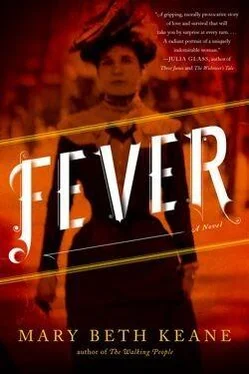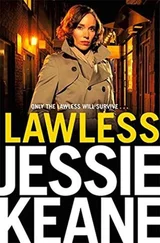“Please,” she said, and he felt sobered.
“But Mary, I know it would be different now. I haven’t—”
Mary moved forward quickly as if she was going to hit him, all that rage simmering just below the features of her face, leaving a mottle of her cheeks, a man’s rage, as they’d noted in the newspapers, an animal’s rage, an immigrant’s rage, something that required four, five, six generations to be properly bred out. But it was only a flicker, and when he blinked she had already drawn herself back, closed her eyes, and then, after a beat, descended the front steps to the sidewalk. “I mean it, Alfred,” she said, and next thing she was gone.
He roamed the city to clear his head, pausing only on park benches and barstools. He spent that night stretched on the long seat of a Model T parked under a tree on Fifty-Seventh Street, the owner’s blanket pulled up to his chin, and then spent the next day at Nation’s Pub. When the car was gone the next evening he found another. He went on this way for a few days, until he remembered the ice company stable, and how warm it would be there with all the animals lined up in their rows, the doors and windows shut tight. Since it was now just a few days until Christmas, there would be no one there except the poor soul who got elected to come by to feed the animals, shake out fresh straw.
The stable was empty. Alfred scrambled through a window that stayed closed all winter but was never locked. Inside, staggering now with exhaustion, he pushed bunches of hay together on the dirt floor, found a spare horse blanket. He’d tell whoever came that he was back on a shift, that he was meant to be there. They would believe him.
He slept for hours, and when he woke it was deep darkness, the horses breathing gently, the one closest to him snorting, as if asking Alfred if he’d awoken, if he was all right now. He sat, pulled his stiff knees to his chest. Mary would come around. She had to. If she didn’t, Alfred considered, then there was not a single person in New York City, not a single person in the world, who cared what happened to him.
Alfred stretched, went into the back room in search of food, and instead found half a bottle of John Powers. Solemn in the face of such good luck, he picked it up as carefully as he might a baby, and brought it tenderly back to the spot where he’d slept. He slid to the ground. He pulled a blanket across his knees. Closing his eyes, he uncorked the bottle and drew a long, ravenous mouthful.
Some time later, he wasn’t sure how long, he noticed the sky outside was gray and he couldn’t decide if that meant day was turning into evening, or night into morning. He placed the empty bottle on the windowsill. He made his way to the back room again, where a simple straight-back chair loomed before him, and behind, the horses made threatening noises with their throats and stamped their feet. It was darker now, and he found a lamp, found a bottle of oil, found a match. Had Christmas come yet? Was it now? He removed the glass and the wick holder and poured in the oil from the plain, unmarked canister in the corner of the room, cursing as some dripped onto the seat of the chair. He twisted off the blackened top of the wick with his fingertips. He shook out a wooden match and struck once, twice. The match broke. He dropped it on the ground, kicked it, shook out another. This time, he heard that small suck of surrounding air, and when the light was born, Alfred held it for a moment before touching it to the tip of the wick.
• • •
Later, looking back at the moment when the flame met the cloth of the wick, he would see it so clearly that he would wonder if he’d been more sober than he realized. He couldn’t recall the weather outside, or the state of his clothing, or the color of that horse blanket, or the last meal he had put in his belly, but he could remember that flame, and the white of that wick. It was as if his mind had taken a photograph that he was able to study only later, the position of the can, the direction of the spout, the odor of the oil. He touched the flame to the wick and swore later that he knew just before it happened, an instant before, a heartbeat before, a space of time so small it would have been impossible to measure. He knew as he was doing it, as he watched the orange meet the white, and one hair to the other side and he would have known before; he would have stopped. He touched the flame to the wick and the room exploded.
And just like that he was gone. I wanted him to leave, Mary reminded herself. I asked him to. All he did was listen. Christmas came and she gave the Borriello boys a set of checkers to share. They had bought her pins for her hair, and as they talked, and ate, and admired the Christmas tree they’d decorated with strings of popcorn, Mary expected him to knock on the door, beg to see her. Why hadn’t he married Liza? Did she kick him out when he came home stewed or did he need a drink only when he saw Mary? At the laundry, the Lithuanians gasped when she told Li to tell Chu that she wouldn’t be wrangle woman anymore. She’d had enough. She would wash. She would do her turns at the front of the store. But no more ironing on a Sunday half-day either. And on top of that she wanted a raise.
“He won’t do it,” Li warned. “Irena and Rasa have been here five years. No increase. Not for you, either.”
“Well then, Irena and Rasa deserve a raise, too,” she said. “What would you do if all of us left you at once? How much business would he lose training three at the same time? More than three, since together we do the work of five. There’s striking and organizing going on all over this city. Why not us?” Even outside of the laundry she felt the world back away from her lately, grant her passage in a way it didn’t do for others. When she walked into shops and pushed her goods across the counter, people shrank further within their overcoats. She argued prices to the penny. She inspected packages for dents, fruit for bruises, meat for dark spots, clothing for loose threads, and brought everything to the attention of the grocer or the butcher or the shop assistant. She bought a pair of shoes and brought them back two days later to say there was a wobble in the left heel. “There’s no wobble,” the man said without touching the shoe, without even putting down the polish rag he was holding. Looking at the haughty expression on his face, he a cobbler with black fingertips, his vest hanging open and missing a button, Mary felt as if time slowed down. She took the shoe out of her bag and dropped it to the counter with a clatter. She felt the eyes of every other person in the shop. “There is a wobble, and I want my money back.”
“Did you wear them?” the man asked as he inspected the sole, and she said of course she wore them. How in the world would she know about the wobble if she hadn’t worn them? The clock ticked. She could hear the soft grunts of a second man stretching leather in the back room, the rhythmic punch of the sewing machine. The man at the counter pointed to a sign: No Returns on Worn Shoes. She nodded at him and then, raising her voice, announced: “This place sells broken shoes and refuses refunds.” She went to the shop door, pushed it open, and repeated it to a group of women passing by. A man browsing the selection inside the door slipped by her and hurried down the street. She picked up the sign on the women’s side of the display window.
“This says Comfort Shoes. Is that meant to be a joke?”
“What’s your story, lady?” the man asked, his hands on his hips.
“I spent my money here thinking I’d gotten something for it. I’ll stand here for a month if I have to, telling people about this place, and about the crookery that goes on here.” She crossed her arms and looked at the man until finally, releasing a single loud sigh, he opened the cash drawer and returned her money.
Читать дальше












